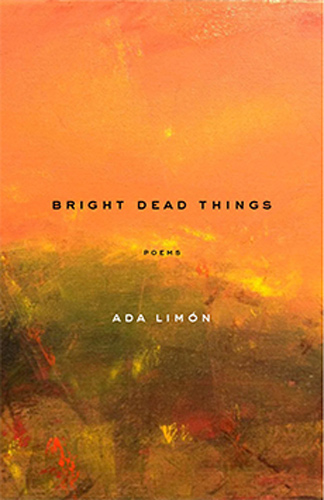Bright Dead Things
Ada Limón’s fourth collection of poems, Bright Dead Things, faces discontentment, nostalgia, and longing in the face of a changing environment. The speaker examines her place in a varied world littered with its fried pickles, wide expanse of blue skies, fields full of fireflies and the stars they mirror. Limón brings us a world we recognize. Where the death of a loved one comes flooding back over margaritas at a Mexican restaurant, where animals suffer, where we leave small pleasures in old cities, and where life goes on despite all of it. Ada Limón’s fourth collection of poems, Bright Dead Things, faces discontentment, nostalgia, and longing in the face of a changing environment. The speaker examines her place in a varied world littered with its fried pickles, wide expanse of blue skies, fields full of fireflies and the stars they mirror. Limón brings us a world we recognize. Where the death of a loved one comes flooding back over margaritas at a Mexican restaurant, where animals suffer, where we leave small pleasures in old cities, and where life goes on despite all of it.
Bright Dead Things reminds readers to find contentment, despite the tragedies and misfortunes of life. Following the death of a loved one, the speaker in “After You Toss Around the Ashes” recalls, “After it was done, I couldn’t / go back to my life.” She goes on,
It wasn’t until later, when
I moved in with him and stood outside on our patchy imperfect
lawn, that I remembered what had been circling in me: I am beau-
tiful. I am full of love. I am dying.
Death is all around us, even as our lives move forward. Even as we ourselves, move constantly toward death.
Death makes itself visible in “In the Country of Resurrection” as well. When the speaker and her partner come up on a possum suffering after being hit by a vehicle, they decide to kill it “out of mercy.” The suffering, both of the possum and the speaker, is palpable: “The sound it was making. The sound / folded me back into the airless car.” They end the animal’s suffering and drive home “under the sickle moon” but the poem does not end there:
But that was last night. This morning
the sun is coming alive in the kitchen.You’ve gone to get us gas station coffee
and there is so much life all over the place.
This poem is a lesson. Life is full of suffering, but it is also full of beauty and small pleasures. It is up to us to recognize the beauty of life all around.
This collection is deeply rooted in place while simultaneously reflecting on feelings of displacement. There is a loneliness associated with moving states and acclimating to new environments. In “The Last Move,” the speaker reflects:
how south we were, far away in the outskirts.
(All the new bugs.)
I put my apron on as a joke and waltzed around carrying
a zucchini like a child.
This is Kentucky, not New York, and I am not important.
The speaker comments openly on the importance place has on our lives. There is a desire to be rooted to our environment, and the speaker examines these challenges with honesty. For some, it takes time to acclimate to new homes (and new bugs), and to find ourselves amidst the change.
“Someplace Like Montana”—a poem that looks backward and forward all at once—begins:
Now when I go to the grocery store,
I’m amazed at the wide aisles of bright
food and food-stuffs, and it’s nothing like
the bodega I shopped in for years,
in Brooklyn, between the bars we liked.
There is an undeniable nostalgia as the speaker looks back on her life years prior. Her youthful longing for more sky, shinier supermarkets, and the simplicity of walking have now become her current reality. This is a poem about “Saturation,” and the speaker contemplates the term, “I think / of that feeling when you’re really full, or life is full / and you can’t think of anything else that could fit in it.” But despite this feeling, the speaker’s life keeps expanding and “there is so much to remember and swallow.” There is always more sky to behold, more items to take in at the grocery store, more pain to endure, and love to enjoy.
Limón reminds us to keep living and loving despite the things we cannot change. In the last poem “The Conditional,” we are asked to consider the end of life as we know it. The poem begins, “Say tomorrow doesn’t come,” as we view images of a dying planet with its petrified trees, animal corpses, and “plastic ditch-litter.” The speaker watches the world fall apart and challenges her lover to, “Say, It doesn’t matter. Say, That would be / enough. Say you’d still want this: us alive, / right here, feeling lucky.” We are reminded that the smallest moments can be enough. Even as we are challenged by displacement, loss, and suffering, there is still “so much life all over the place,” and even if it all ends tomorrow, maybe we should feel lucky anyway.





